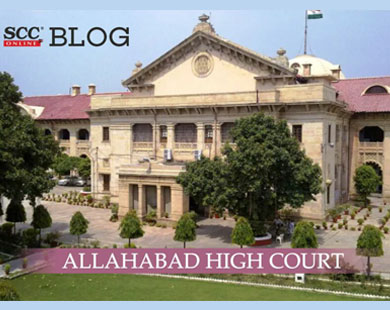Allahabad High Court: In a Jail appealunder Section 383 Code of Criminal Procedure (‘CrPC’) against judgment passed by Additional Sessions Judge, wherein, convict/appellant has been convicted under Sections 302 and 201 of the Penal Code, 1860 (‘IPC’), the division bench of Suneet Kumar and Syed Waiz Mian, JJ. has held that there is no evidence pertaining to offence under Section 201 IPC, however, the conviction under Section 302 IPC is proper and justified in the law, and the impugned judgment and order is not excessive or exorbitant and no question arises to interfere in the matter on the point of punishment imposed upon him.
The Court said that there is no evidence on record to show that how the deceased was throttled, but the accused had himself told his employer, in the presence of the witnesses that he had strangulated the deceased, therefore, there is no evidence on record to show that the accused had tried to screen himself from the legal punishment or he had misled the informant or anyone. Further, there is no evidence to establish that the convict had caused any evidence of the commission of crime i.e., murder, to disappear.
The Court said that to constitute an offence under Section 201 IPC, there must be disappearance of some evidence of the commission of offence. Removing the corpse of a murdered man from the scene of murder to another place does not come under Section 201, as the removal does not cause the disappearance of evidence of commission of the murder. Section 201 will apply only when false information touching the offence with intent to screen the offender is given to those interested in bringing the offender to justice.
Thus, the Court held that there is no evidence pertaining to offence under Section 201 IPC, therefore, the conviction under the aforesaid section by the Trial Court is erroneous, perverse and without any evidence, therefore, the conviction, under Section 201 IPC cannot be upheld against the convict and he is accordingly acquitted of the charge under Section 201 IPC.
The Court said that the Supreme Court has observed consistently that in a criminal case based on the circumstantial evidence, chain of circumstances must be complete and on completion of such chain, only one conclusion can be drawn, that it is only the convict who had committed the crime.
The Court placed reliance on Suraj Singh v. State of U.P., (2008) 16 SCC 686 , wherein it was held that “the evidence must be tested for its inherent consistency and probability of the story; consistency with the account of other witnesses held to be creditworthy; consistency with the undisputed facts, the credit of the witnesses; their performance in the witness box; their power of observation etc. Then the probative value of such evidence becomes eligible to be put into the scales for a cumulative evaluation.”
Further, it placed reliance on Sharad Birdhichand Sarda v. State of Maharashtra, (1984) 4 SCC 116, wherein the conditions to be fulfilled before a case against an accused can be said to be fully established were given by the Court.
The Court said that merely based on the subsequent conduct of the convict, the trustworthy evidence of the witnesses on record cannot be disbelieved. It is for the prosecution to prove the involvement of the convict in the commission of the crime beyond all reasonable doubts, and in the present case the prosecution has successfully completed the chain of circumstances.
However, the fact that what happened to the victim after he was last seen by the witnesses was within the knowledge of the convict, but that is specifically in his knowledge.
Further, referring to Section 106 of the Indian Evidence Act, 1872, which says that when any fact is especially within the knowledge of any person, the burden of proving that fact is upon him. The convict has miserably failed to rebut the presumption under Section 106.
Thus, it was held that the conviction under Section 302 I.P.C. is proper and justified in the law, and the impugned judgment and order is not excessive or exorbitant and no question arises to interfere in the matter on the point of punishment imposed upon him.
[Gulam Rashul v. State of UP, 2022 SCC OnLine All 901, decided on 23-12-22]
*Apoorva Goel, Editorial Assistant has reported this brief.







